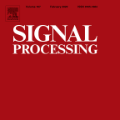Micro Air Vehicles (MAVs) are increasingly being used for complex or hazardous tasks in enclosed and cluttered environments such as surveillance or search and rescue. With this comes the necessity for sensors that can operate in poor visibility conditions to facilitate with navigation and avoidance of objects or people. Radar sensors in particular can provide more robust sensing of the environment when traditional sensors such as cameras fail in the presence of dust, fog or smoke. While extensively used in autonomous driving, miniature FMCW radars on MAVs have been relatively unexplored. This study aims to investigate to what extent this sensor is of use in these environments by employing traditional signal processing such as multi-target tracking and velocity obstacles. The viability of the solution is evaluated with an implementation on board a MAV by running trial tests in an indoor environment containing obstacles and by comparison with a human pilot, demonstrating the potential for the sensor to provide a more robust sense and avoid function in fully autonomous MAVs.
翻译:微型航空飞行器(MAV)越来越多地用于封闭和封闭环境中的复杂或危险任务,如监视、搜索和救援等,因此,在可见度差的情况下操作的传感器必须便于导航和避免物体或人员; 雷达传感器尤其能够在照相机等传统传感器在有灰尘、雾雾或烟雾的情况下失灵时对环境进行更强的感测; 虽然在自动驾驶中广泛使用小型调频CW雷达,但在磁飞行器上相对没有探索; 这项研究的目的是通过使用传统的信号处理,例如多目标跟踪和速度障碍,来调查这种传感器在这些环境中的使用程度; 利用在装有障碍的室内环境进行试验,并与人类实验者进行比较,从而通过在装有障碍的室内环境中进行试验,评估这种解决办法的可行性,表明传感器有可能在完全自主的MAVA中提供更强的感知觉和避免功能。





